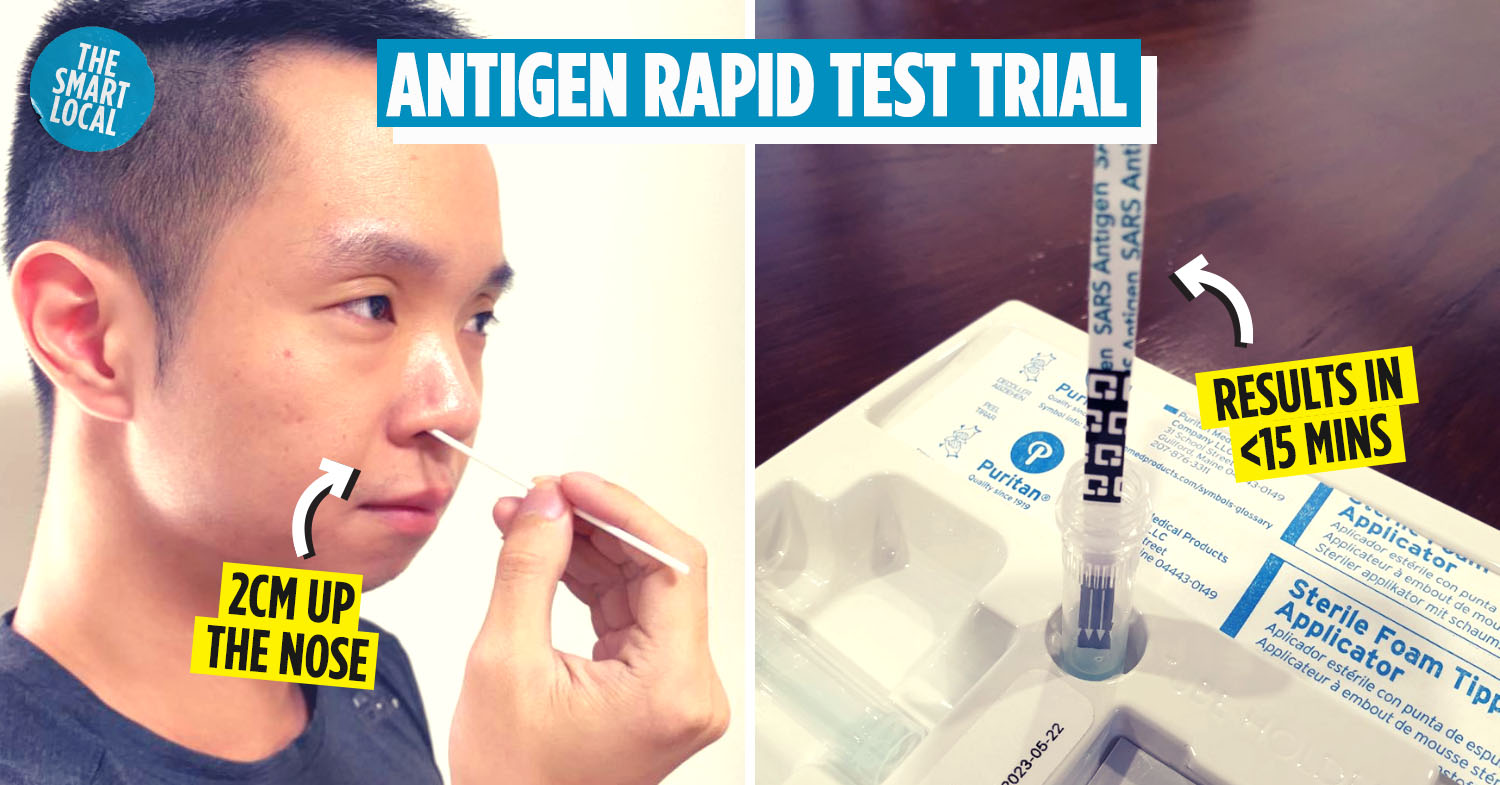Antigen Rapid Test Kit review
The words “community cases” have been ringing loud in our ears over the past few weeks. With Covid-19 still rife among us, many of us have wondered if we may be carrying the virus without knowing. After all, asymptomatic cases are a reality that’s pretty unnerving.
Thankfully, Antigen Rapid Test (ART) kits have flown to the rescue – sort of. Meant to be a form of early detection of the virus, these self-test swabs are now available at major pharmacies like Guardian and Watsons.
While it’s not an alternative to more thorough Polymerase Chain Reaction (PCR) swab tests by MOH, it still offers some peace of mind for those who are worried. Instead of taking one to two days to get your results, ARTs take just less than 30 minutes. It detects proteins from the virus, but is not as accurate as PCR tests.
As individuals with curious minds, we decided to test the two ARTs available to the public: the Abbott Panbio Covid-19 Antigen Self-Test ($12.80) and the QuickVue At-Home OTC Covid-19 Test ($20.80). Here’s how they fared:
The self-test kit tributes
Josiah, did a PCR swab twice
Tried the Abbott Panbio Covid-19 Antigen Self-Test
Despite being a homebody that showed no symptoms, I couldn’t escape the nagging voice inside my head that I could have been exposed to Covid-19 at some point over the past couple of weeks. And having had two uncomfortable swab tests previously, the self-test kit would alleviate my jitters and give me some control over the comfort of my nostrils.
Jessica, never been swabbed
Tried the QuickVue At-Home OTC Covid-19 Test
With a husband who’s a frontline worker, I’ve always been paranoid about how we’re at relatively high risk of contracting Covid-19. While he gets a more invasive PCR test each week, I’ve been lucky enough to have never required one.
First impressions of the Covid-19 Antigen Rapid Tests
Abbott Panbio
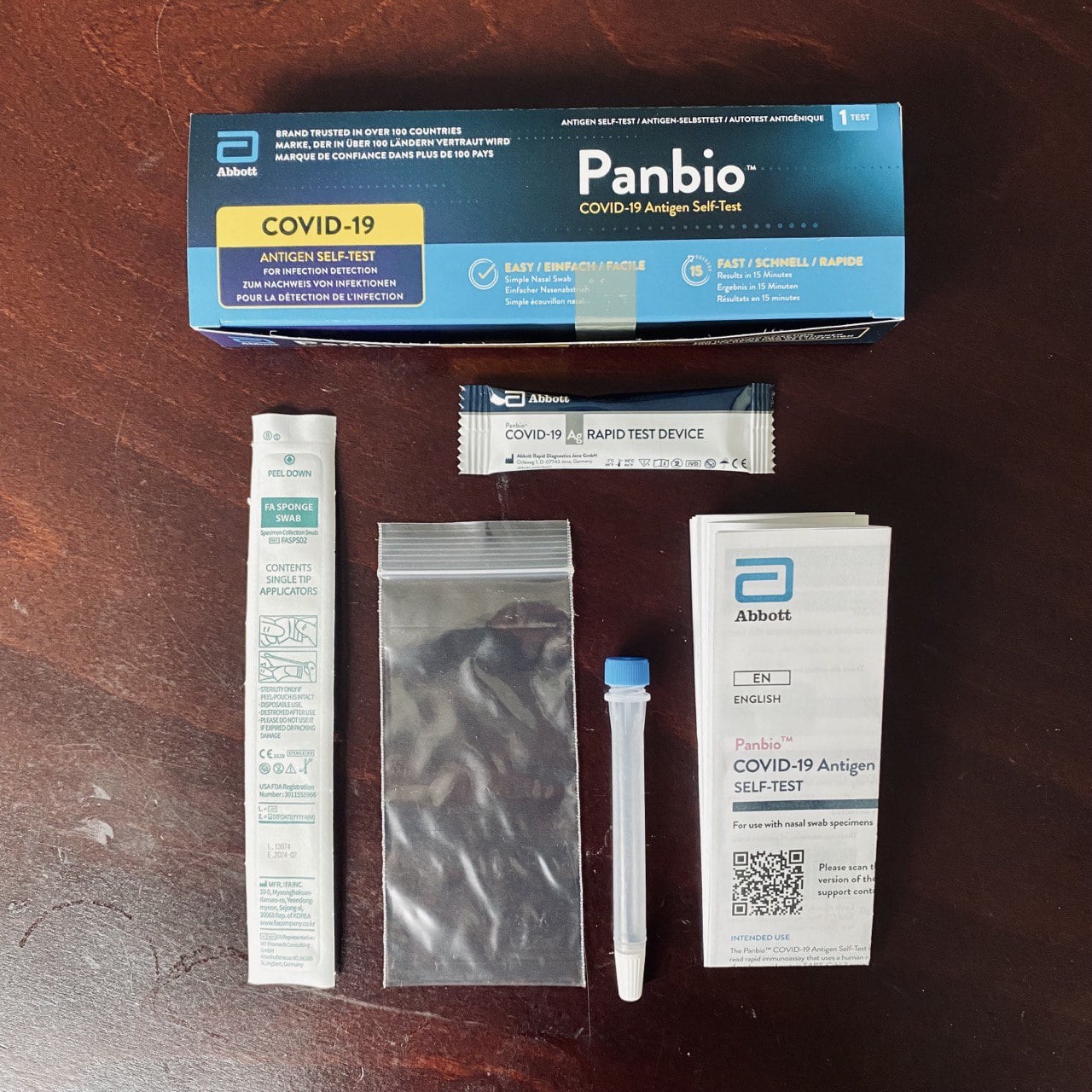
Image credit: Josiah Neo
At just $12.80 per test kit, the Abbott Panbio Covid-19 Antigen Self-Test was a lot more affordable than I had expected. And sure, it being an antigen rapid test (ART) means it’s not as sensitive as a PCR test. But being able to get a result within 15 minutes rather than 24 hours is a godsend for my anxious self.
Buying the test kit at my nearest Guardian was also seamless – I was in and out of there in less than five minutes. I would be lying if I said I wasn’t excited on my way back home at the prospect of self-administering a Covid-19 test at home.
As this kit only had one test, it wasn’t as intimidating as QuickVue’s kit, and the instructional guide that came in three languages probably took up more space than all the rest of the components. After taking a flat lay like any millennial is inclined to, it was time to get poked by the swab.
QuickVue:
To be honest, I chose the QuickVue At-Home OTC Covid-19 Test because my kiasu self thought, “wah, got two tests, means it’s more worth it!”
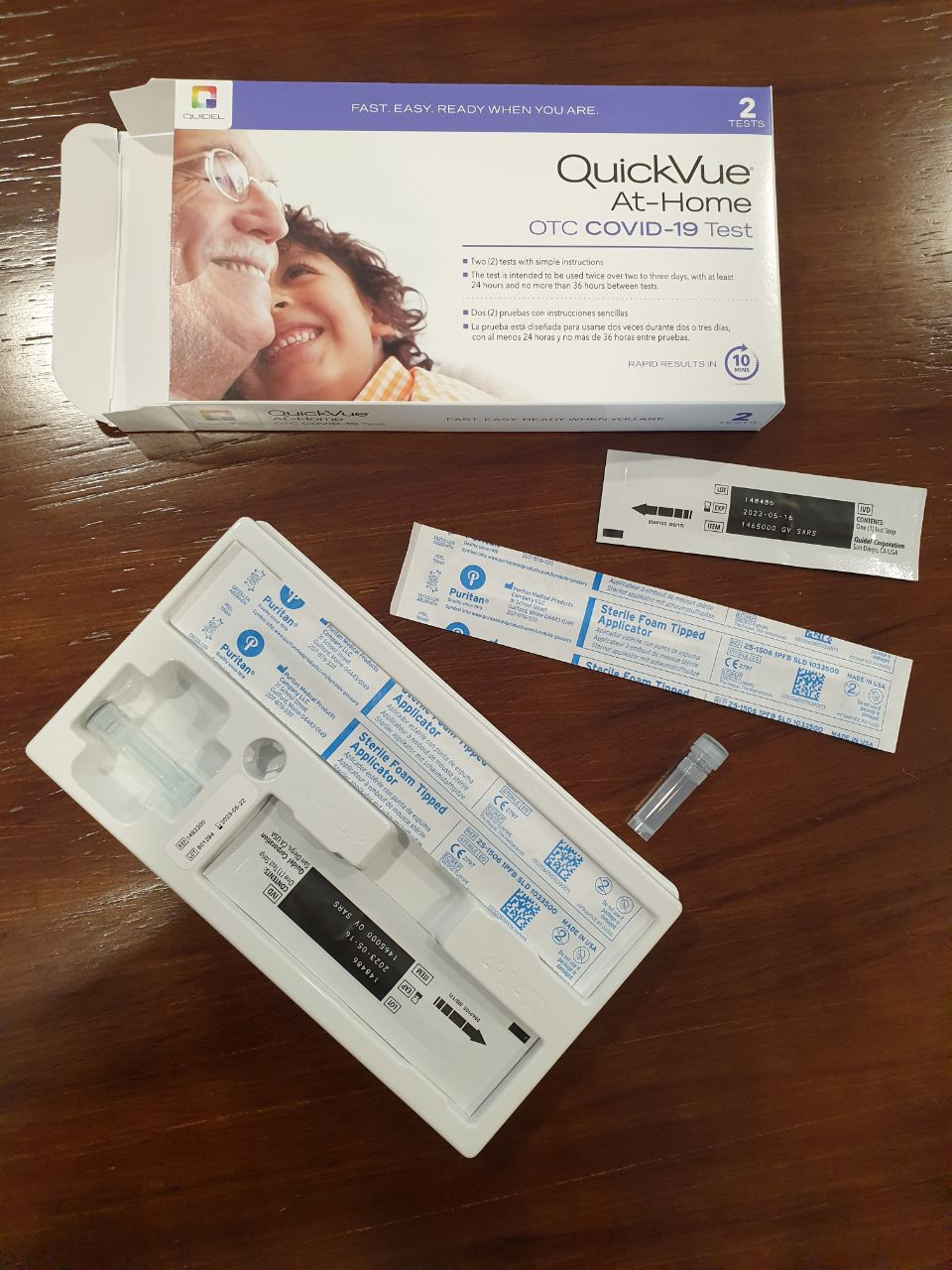
Image credit: Jessica Fang
Purchasing it was rather straightforward, and the pharmacist gave me a pretty detailed rundown on who can and cannot use the test kit. He mentioned that since the test kit came with two swabs, you could easily use the second one if you got an invalid result. He also handed me a detailed brochure, so you can expect to leave with a ton of advisories and information when you purchase an at-home test kit.
I’m not going to lie – the test kit looked pretty intimidating at first. It comes with two vials with a light blue liquid inside, and packaged nasal swabs and test strips. The plastic container that holds it all even comes with a holder for the vials, so it looks like a little science experiment.
Taking the test
Abbott Panbio
Seeing all the steps laid out by the guide was a little bit aggressive, but it can be easily distilled into five easy steps that can be done in 20 minutes or less:
- Squeeze the liquid from the buffer bottle into the tube
- Swab both nostrils up to 2CM deep five times
- Insert the swab stick into the tube
- Squeeze the liquid onto the test device
- Wait 15 minutes for your results
There are also simple-to-follow images and even a scannable QR code for more in-depth information and instructions.
It might not look like much but the packaging of the box has a part to play in the whole process; the clear plastic you would’ve otherwise thrown out has a slot to keep the tube and liquid inside upright so you won’t accidentally spill it. These little quality-of-life details really added to the convenience of the test kit.
Once that was set up, it was time for my most dreaded part of the test: swabbing myself. With the regular PCR test, you might have read horror stories about people feeling as though their brains were getting scraped. And having gone through two tests prior to this, I was not looking forward to putting the swab stick up my nose.
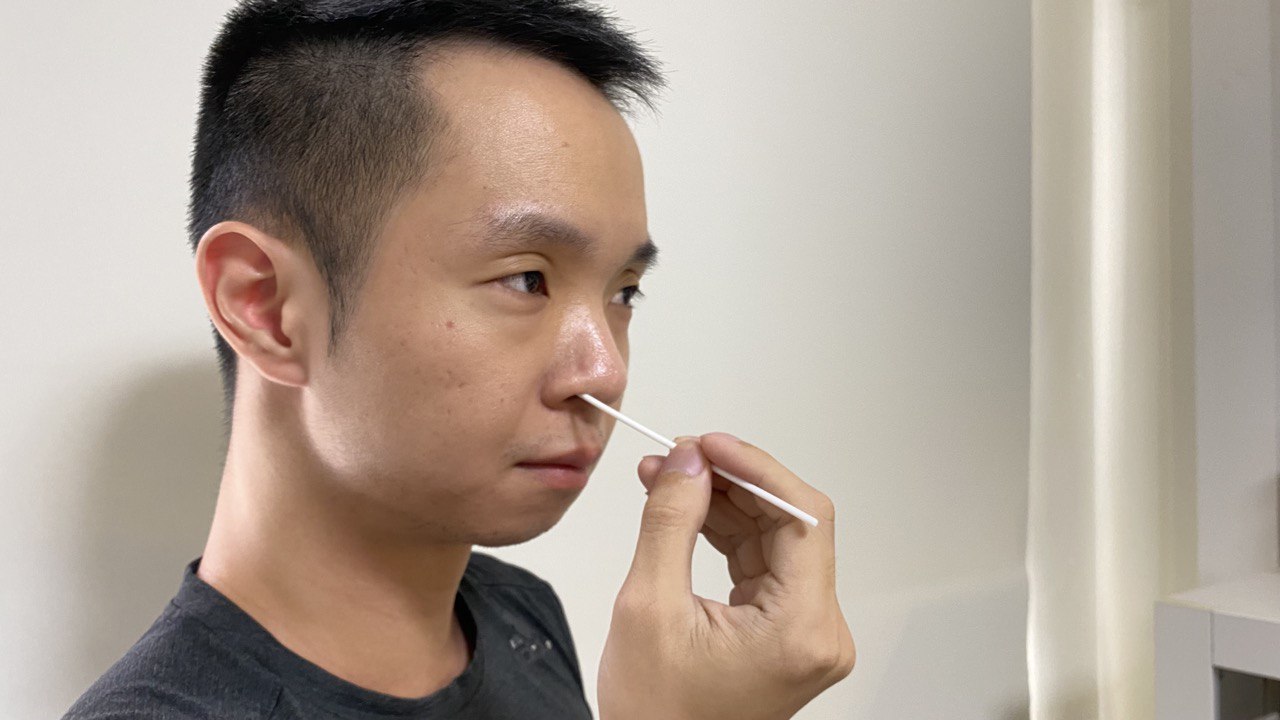
Image credit: Josiah Neo
“It’s just two centimetres Josiah, it’s not that deep.” I had to hype myself up. After doing some agaration of where that 2CM mark was, I slowly but surely stuck it up my nostril. TBH, I was expecting that 2CM to have gone a lot deeper, but it just felt like a slightly more intense tickle.
Antigen rapid tests like these actually don’t require you to prod the entire length of your nose like a normal swab test. But there is also a downside to their ease of use as they have a higher chance of giving you a false negative result since it’s less sensitive than the PCR tests. If you’re showing any symptoms of Covid-19, you’re better off visiting a test centre instead.

Image credit: Josiah Neo
After my nose was thoroughly tickled, the rest of the test went on without a hitch. It was easy transferring my swab stick over to the tube thanks to the earlier step and the handy packaging. The tube also has a little squeezer for you to squeeze the solution that’s been mixed with your snot onto the test device itself. Then the waiting game begins.
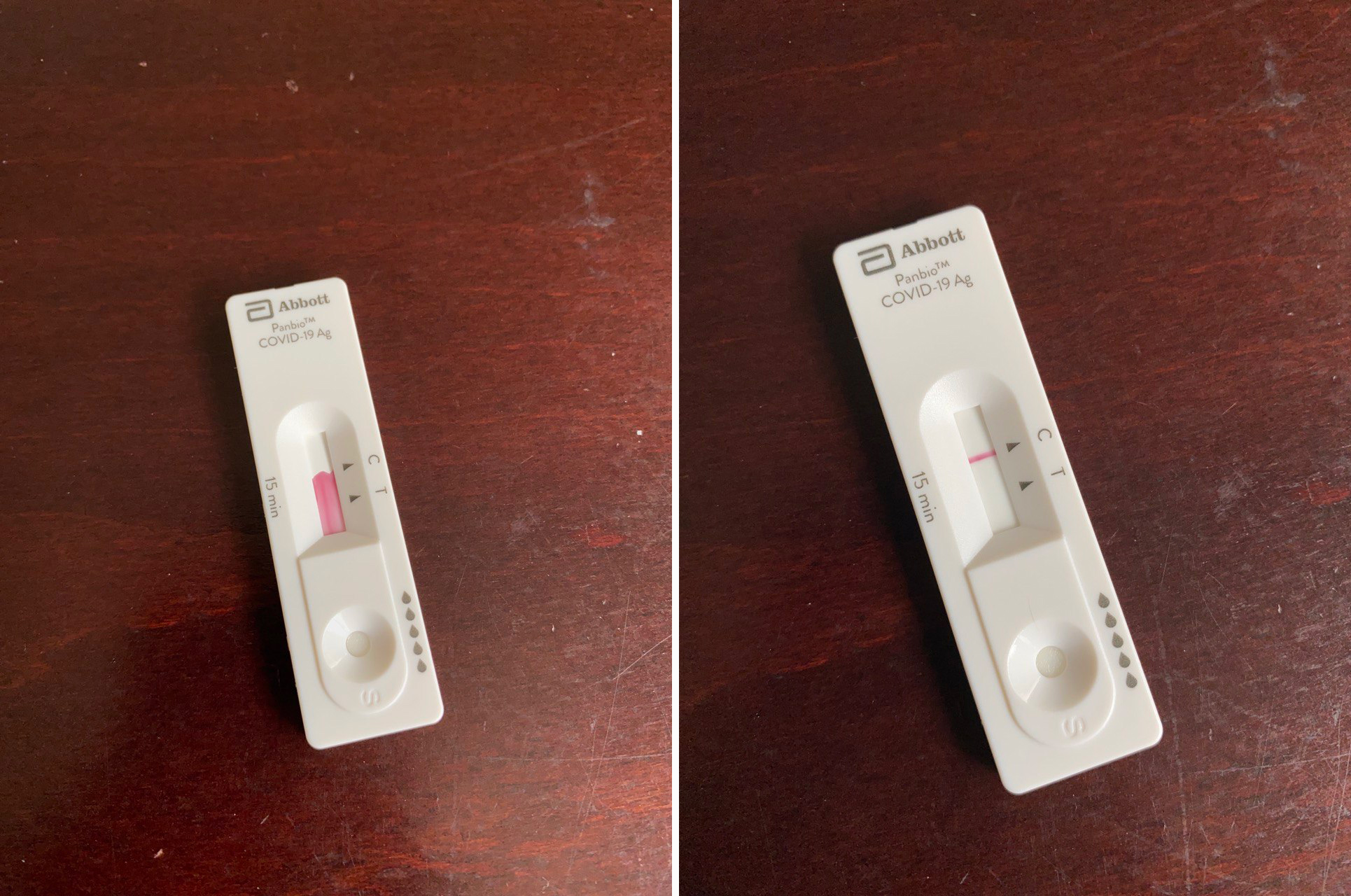
Left: What the test device will look like for most of the 15 minutes
Right: The single line below the Control (C) line means you’re negative; another line under Test (T) means you’re positive
Image credit: Josiah Neo
While my first two Covid-19 tests took around 48 hours to come back with a result, I only had to wait 15 minutes for the self-test kit. I even had time to cook and finish a bowl of Indomie before my timer went off. Third time’s the charm for a convenient and comfortable Covid test.
Ratings:
Ease of use: 9/10 – clear instructions with user-friendly packaging.
Time taken out of your day: 8/10 – 20-ish minutes, can be faster if you’ve done it before.
Comfort level: 9/10 – a light tickle compared to the hard stabbing of PCR tests.
Coolness factor: 6/10 – my mom said it looked like a pregnancy test.
QuickVue
There are 10 steps to this test, and you’ll have to ensure you have a timer on standby in order to get the most accurate results. But all in all, the process itself is actually quite simple:
- Open one of the tubes containing the liquid and place it in the tube holder.
- Swab both nostrils using the same swab.
- Plonk it in the tube for one minute.
- Remove it and plonk the test strip into the same tube.
- Wait 10 minutes before removing it to check your results.
With extremely specific steps provided, any layman should be able to easily perform the home test. However, it’s not klutz-proof. Perhaps that’s why it comes with two swabs in case you screw up the first one.
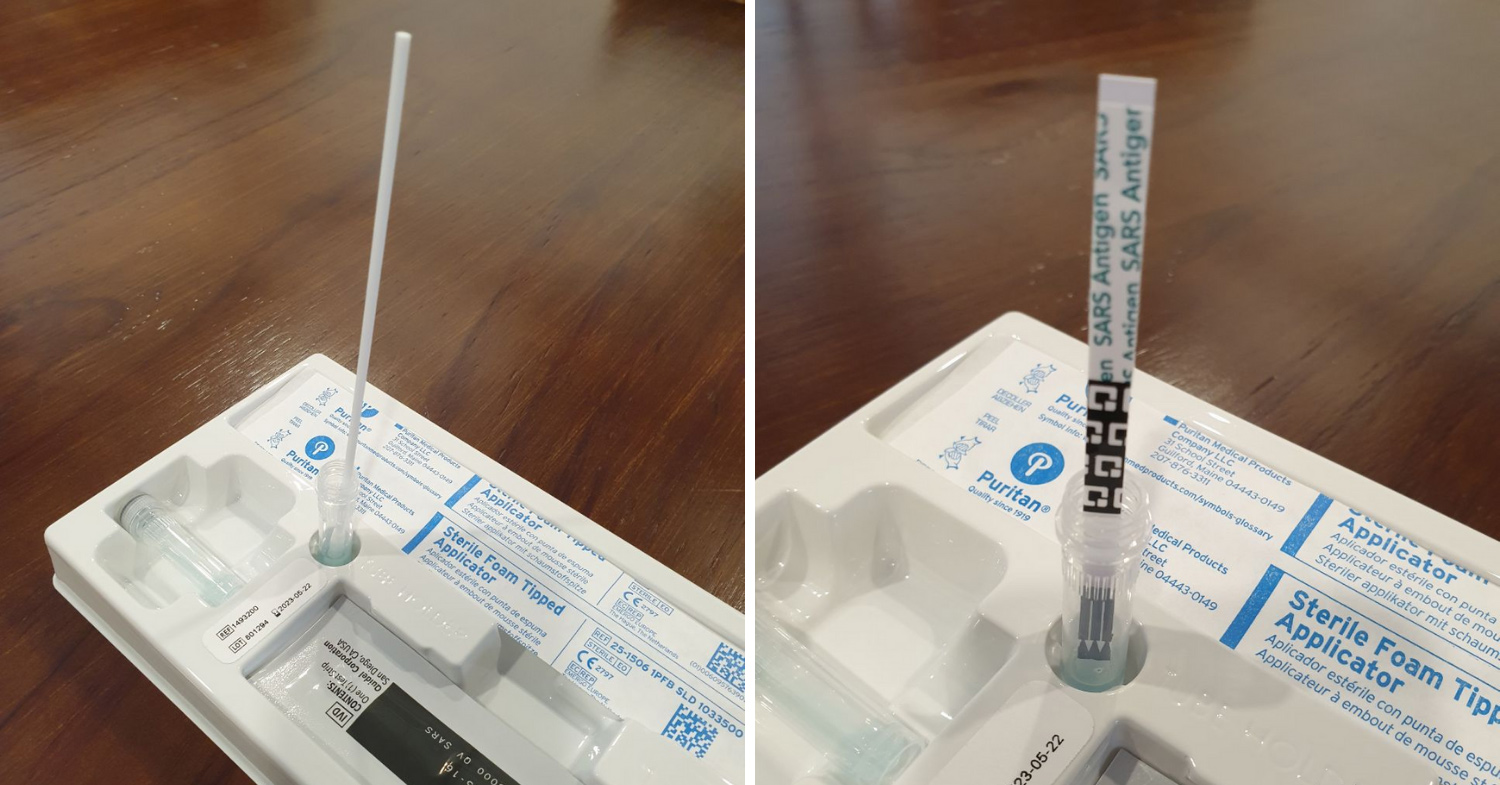
Image credit: Jessica Fang
The tube holder is part of the lightweight plastic packaging the test kit comes in, so you have to be careful not to topple it over. You also have to hold back any sort of gusto when it comes to opening the swab and test strips in case you damage or taint them.
And if you’re thinking this might be your chance to siam getting prodded up your nose, that’s still a pipe dream. It’s not too uncomfortable though – just insert the swab about 2CM up your nostril and swab the inside of each nostril four times.
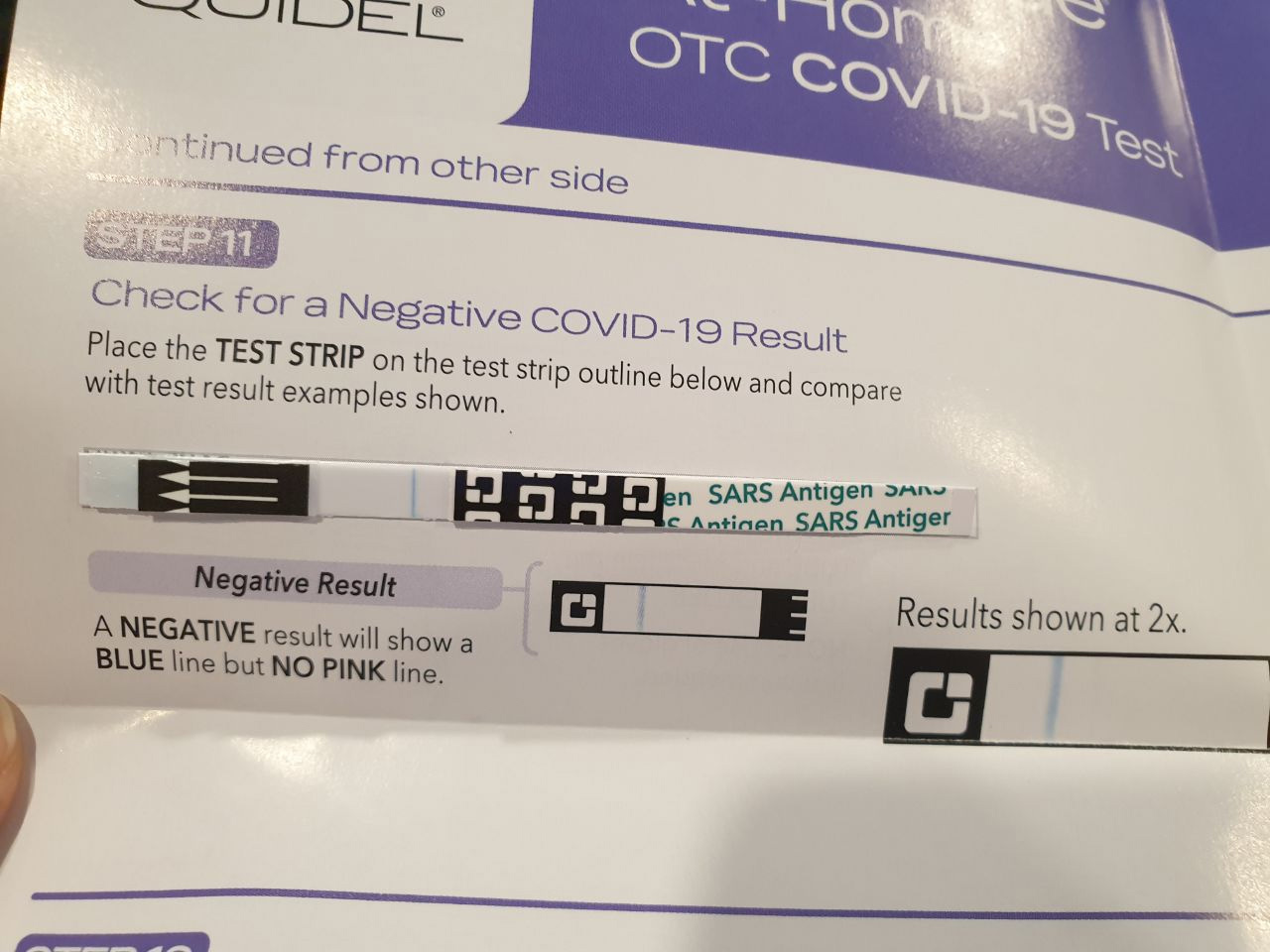
The instruction manual comes with an easy guide on how to evaluate your test result
Image credit: Jessica Fang
Word of advice: familiarise yourself with all the steps before starting. Being the lazy ass I am, I ended up stumbling because I didn’t remove the cap of the tube before performing the swab. That meant I had to hold my snot-soaked swab and open the small tube at the same time. Thankfully, all was well.
Ratings:
Ease of use: 7/10 – it’s higher if you like to read instructions.
Time taken out of your day: 9/10 – below 15 minutes.
Comfort level: 8/10 – it tickles.
Coolness factor: 9/10 – because you have a test tube and you’ll feel like a SciEnTiSt.
Final thoughts on the Covid-19 Antigen Rapid Test kits
You’d think that taking the Covid-19 Antigen Rapid Test at home would be a stress-free situation, but truth be told, it’s riddled with some anxiety.
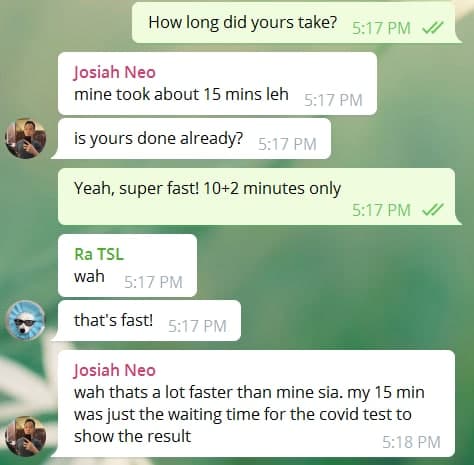
Image credit: Jessica Fang
For one, if you do get positive or invalid results, you need to head to the nearest clinic for a proper PCR test. Secondly, that 10 minutes of waiting for your result comes to a standstill. And even if you’re in the pinkest of health, there’s always a nagging, “what if I’m positive” at the back of your mind.
But since it’s easy to purchase from any major pharmacy, it’s a less risky option if you want to test yourself. At $20.80, the QuickVue At-Home OTC Covid-19 Test is also reasonably priced. But after learning that the two test kits are meant to be used in the span of 36 hours, perhaps the Abbott Panbio Covid-19 Antigen Self-Test may be more worth it at $12.80.
Things you must know:
- This test isn’t a direct replacement for the official swab operations carried out by MOH.
- If you’ve been contacted by MOH to go for a Covid-19 test, you should follow their instructions instead of doing an at-home test.
- If you’re displaying symptoms such as cough, flu, runny nose and fever, head straight to a Swab and Send Home (SASH) clinic.
- If your ART self-test comes back positive, visit a SASH clinic to get a PCR test.
This article was co-written by Jessica Fang and Josiah Neo.
